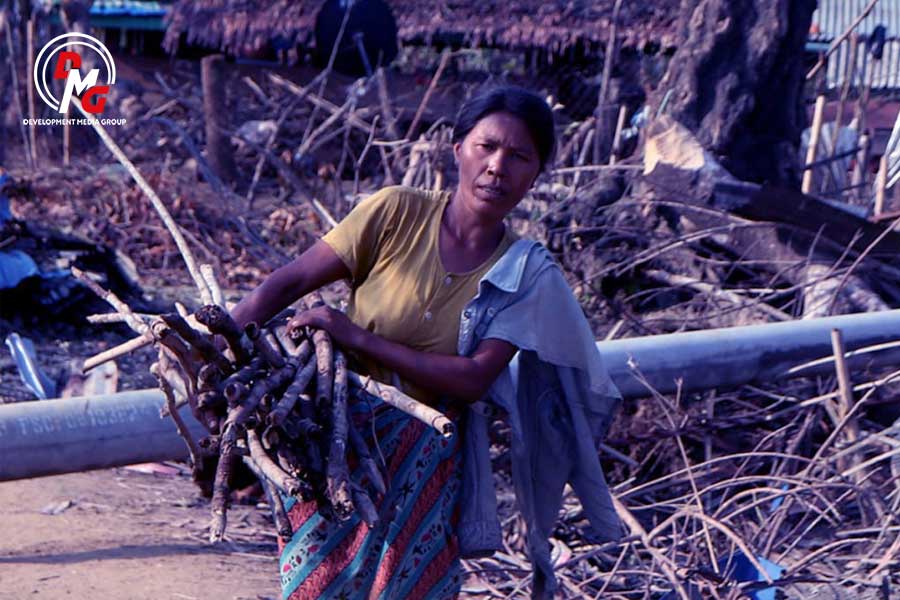- Hindus express hope for educational reform under AA administration
- Arakanese zat pwe performers struggle to survive as conflict halts traditional shows
- India-Arakan trade routes fully reopen after two-month closure
- When Prisoners Are Bombed, the War Has No Rules Left
- Two civilians killed, two injured in junta airstrike on Ramree village
Editorial: After a Year of Bombs, Bullets and Blockades, Famine Stalks Arakan
The junta's trade blockades, which aim to cripple the AA, have had little success militarily but have inflicted severe hardship on millions of civilians in Arakan State who are now struggling to access food.
25 Nov 2024

The most recent period of fighting between the Myanmar military and Arakkha Army (AA) in Arakan State marked its one-year anniversary on November 13, 2024. In other words, it has been about 12 months since the regime imposed far-reaching blockades on Arakan State.
From the onset of the conflict, the regime has exercised its notorious "four cuts" strategy, cutting off supplies of food and other commodities from other parts of the country to Arakan State and between townships within the state, causing severe shortages of food, medicines, and other necessities.
The junta's trade blockades, which aim to cripple the AA, have had little success militarily but have inflicted severe hardship on millions of civilians in Arakan State who are now struggling to access food.
Over the past year, hundreds of thousands of people have been displaced by the fighting in Arakan State, with many now relying heavily on aid from donors, social organisations, and humanitarian agencies to survive.
The AA has captured 10 townships in Arakan State, while ongoing clashes in the southern part of the state are driving more people to flee their homes.
Meanwhile, the conflict and junta pressure have forced nongovernmental organisations (NGOs) to abandon Arakan State, worsening the plight of those in need, according to the United Nations Development Programme (UNDP).
The UNDP recently warned that if the current food crisis is not resolved, more than 2 million people in Arakan State could face starvation by mid-2025.
"With restrictions on goods entering Rakhine [Arakan State] across international and domestic borders, absence of incomes, hyperinflation, significantly reduced domestic food production, and a lack of essential services and a social safety net, an already highly vulnerable population may be on the brink of collapse in the coming months," the UNDP warned in a report released earlier this month.
It added: "Without urgent action, 95% of the population will regress into survival mode, left to fend for themselves amid a drastic reduction in domestic production, skyrocketing prices, widespread unemployment, and heightened insecurity. With trade routes closed and severe restrictions on aid, Rakhine risks becoming a fully isolated zone of deep human suffering."
Most residents in Arakan State lack internet access, making them unaware of these grim warnings, though they surely feel the harmful effects of the regime blockades in their day-to-day lives.
Blood Money, a group of activists campaigning for international sanctions against the junta, points out that military governments past and present have targeted ethnic regions with long histories of resistance against central control, such as Kachin, Kayin, Arakan and Shan states.
Facing military defeats on its western flank as well as in the north of the country and elsewhere, the junta appears intent on maintaining its blockades of Arakan State, pushing its population to the brink of starvation. The junta's actions in Arakan can be seen as constituting crimes against humanity, inflicting widespread suffering on civilians of all ages, religious creeds and socioeconomic statuses.
The UNDP estimates that local food production will only meet 20% of Arakan State's consumption needs between March and April 2025.
With the prospect of imminent famine, local food production should be boosted in whatever ways possible, and international pressure on the regime must focus on lifting the blockades to allow life-saving food supplies to flow freely into Arakan State to meet the shortfall projected for next year and potentially beyond.
If the junta proves intransigent in this, new trade routes not sanctioned by the generals ought to be explored to avert a humanitarian disaster. With neighbours Bangladesh and India close by, where there is a will, there is a way. And in the 21st century, there should always be ways to prevent famine.







.jpg)












